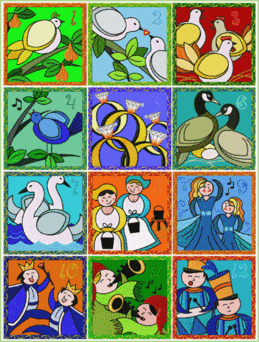TODAY IS Christmas, which means, among other things, that you’ve spent the last five weeks listening to the same two dozen holiday songs over and over and over. By now, you’re probably sick to death of most of them. Put it this way: it’s no longer fun to laugh and sing a sleighing song—tonight, tomorrow, or ever again.
Before you put your holiday CDs into a box marked DO NOT OPEN TIL XMAS, I’d like to take this opportunity to examine the lyrics of some holiday favorites, as part of our recurring “Song Beneath the Song” feature. I’ve listened to these songs so many times, and for so many years, that I never really listened. This year, I did. And I want you to hear what I hear.
First, some general notes:
1. All the songs about the Nativity operate under a single common assumption: that Jesus was a good baby. No colic in the manger! The Christ Child did not cry, apparently. Ever. In His serene and beatific presence, cattle low, oxen and lambs keep time, shepherds quake, Heaven and Nature sing, and myrrh-bearing kings of the Orient speak with Yoda-esque phraseology. The proof that he’s the Son of God, you see, is that he sleeps for ten hours at a clip—through the silent night.
2. I enjoy holiday music, but I’m a traditionalist. “Do They Know It’s Christmas” notwithstanding, I don’t like when rock stars record Christmas carols. I owned A Very Special Christmas Album (1987) on vinyl, but I always found something weird about Annie Lennox singing “Winter Wonderland.” It was like a boundary had been crossed. I love Annie, but that song should really be performed by Johnny Mathis, and only by Johnny Mathis.
3. My favorite Christmas song of all time is “The Wexford Carol,” as realized by Jessica Radcliffe, with her pagan lyrics. I highly recommend buying this.
Now, on to the songs:
~
“Rudolph the Red-nosed Reindeer”
The bloated toy-factory overlord turns a blind eye when his charges mercilessly bully and exclude the reindeer with a birth defect…until he realizes said reindeer might be of some use to his commercial operation, whereupon the eponymous Rudolph is shackled to a sleigh and used as a beast of burden. And only then did all the reindeer love him.
“Do You Hear What I Hear?”
A musical game of Telephone, in which the information flows like so:
night wind –> little lamb –> shepherd boy –> mighty king –> people everywhere
thus proving that, at least to the question posed in the title, the answer is indeed blowing in the wind. My wife likes to point out the shortsightedness of the shepherd boy’s prevailing upon the mighty king to deliver, to a newborn baby shivering in the cold, shiny metal coins instead of, say, a down comforter and a space heater.
“The First Noel”
Here are the opening lyrics:
The first Noel, the angels did say,
Was to certain poor shepherds
In fields as they lay,
In fields as they lay
Keeping their sheep,
On a cold winter’s night
That was so deep,
Noel! Noel! Noel! Noel!
Born is the King of Israel.
Now, let’s diagram this as a sentence. Eliminate the prepositional phrases and extraneous clauses—reduce it to simple subject/predicate—and what you get is this:
The first Noel was Noel!
That’s pretty deep. As deep as a cold winter’s night, even.
I used to think certain was used as a verb here, meaning something like “to make them be certain and believe,” but since I have never seen the word used that way anywhere else, ever, in almost four decades of reading, I am forced to conclude that these lyrics are complete nonsense. And if you didn’t think so before, this piece will certain you.
“The 12 Days of Christmas”
While many might raise an eyebrow at the inappropriate gifts proffered by the narrator of this holiday favorite—Was there ever a time and place where it was okay to transfer ownership of eight dairy maids and nine ladies dancing? Why would anyone want a single, solitary leaping lord, let alone ten? And why is the singer so obsessed with birds? Does he own an aviary?—my main objection is mathematical. A partridge in a pear tree is not one gift; it’s two. Which defeats the purpose of the song, which is (I think) to teach little kids how to count. Or perhaps to use in secret CIA prisons to get terrorists to talk.
“Winter Wonderland”
I have sung this song as a lullaby since my son was born on Christmas Day in 2004, and only recently did I realize that it is completely and totally nondenominational. Not once do they say Christmas, or talk about Jesus, or Santa, or reindeer, or elves. The closest it comes to religious is pretending a snowman is Parson Brown—whose fate will be overthrow by the “other kiddies.” There is also talk of conspiracy and the need to “face unafraid / the plans that we made.” See? It’s quietly subversive. The “Winter Wonderland” is really a post-capitalist utopia.
“The Little Drummer Boy”
In this, the ultimate anti-commercialism carol, a starving artist cannot afford to give money to the newborn king, so he pays tribute with his music. And Jesus smiles at him! The Christ child is a patron of the arts! Buh-rum-buh-bum-bum! (Sidenote: this means that Jesus wants you to forward this post to a friend in lieu of a Christmas card). As much as I dig this song, I am compelled to point out that even the Virgin Mary isn’t a patient enough mother to allow some strange kid, even if he is the first coming of Neil Peart, to play drums for a newborn baby.
“We Wish You a Merry Christmas”
We do. Here at the Weeklings. Sean: “We wish you a merry Christmas.” Jen: “We wish you a merry Christmas.” Me: We wish you a merry Christmas, and a happy New Year.
And now that I’m in possession of my “figgy pudding,” I will take leave of you until 2013. (If I didn’t have it, I’d have to stay, because I made it pretty clear that I wouldn’t go unless I got some).
SONG BENEATH THE SONG, which title we’ve purloined from the (fine) Maria Taylor tune of the same name, is an occasional feature in which we attempt to decode the meaning of popular song lyrics.






Next year I would like to hear your analysis of this lyric:
Christmas is coming, the goose is getting fat
Time to put a penny in the old man’s hat
If you haven’t got a penny, a ha’penny will do
If you haven’t got a ha’penny, then God bless you!
God bless us, everyone. Seriously.